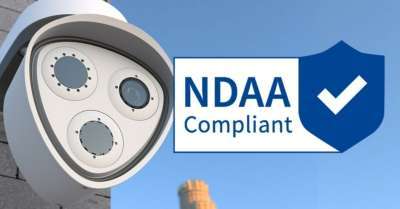NDAA (the National Defence Authorisation Act) is a set of federal laws passed yearly by the US government to determine the annual budget for the US Department of Defence. The John S. McCain National Defence Authorisation Act for Fiscal Year 2019, states that there is a “Prohibition on certain telecommunications and video surveillance services or equipment.” How this relates to the security industry has to do with certain companies within the People’s Republic of China, and what can and cannot be installed on government or military properties.
Those technology and surveillance companies are:
- Hauwei Technologies Company
- ZTE Corporation
- Hytera Communications Corporation
- Hangzhou Hikvision Technology Company
- Dahua Technology Company
In order for video surveillance equipment to be installed in facilities or on properties requiring NDAA compliance, none of the components themselves, or sub-components within the security cameras or recorders can be manufactured by those companies listed above. This relates to the finished products and components (including chipsets) inside.
How Do I Know If I’m Buying An NDAA Compliant Camera Or Recorder?
When it comes to determining if a security camera or recorder meets NDAA requirements, a discussion has to be had with your distributor. There are two major questions to ask.
1 – Find out the OEM manufacturer
You will need to find out what OEM (original equipment manufacturer) the distributor is using, and whether or not they are on the banned list.
2 – Determine The Chipset
If the OEM is not on the banned list, then you’ll need to find out what chipsets/internal components (we’ll just refer to this collectively as the “chipset”) the equipment is using, and whether or not that is made by a banned company.
Hikvision, Dahua, and Hytera Security Equipment
Due to their high quality and competitive pricing, Hikvision and Dahua, the two biggest security and surveillance equipment producers in China, are extremely popular in the United States. It’s crucial to remember that just because your distributor sells some potentially illegal goods doesn’t mean that all of their products are illegal or that the distributor is illegal.
Only that device is prohibited. If your distributor offers other NDAA-compliant product lines, these may be marketed as such. Even if the chipset being utilised in Hikvision or Dahua is compatible, the product itself is prohibited. If the chipset within a security camera or recorder is prohibited, the complete camera or recorder is prohibited for manufacturers who are otherwise permitted to make them.
Deciphering the Chipset
After the manufacturer of the cameras and recorders is determined, the next thing to do is find out who manufactures the chipset that is being used, or the ‘brains’ of the equipment. Huawei is the world’s largest distributor of surveillance industry chips, under the brand name Hisilicon.
Some examples of alternative chips that are considered to be NDAA-compliant are:
- Ambler
- MStar
- Intel
You must once more inquire about the chipsets used in the equipment your distributor claims to be NDAA compliant. You should be able to get paperwork from your distributor that lists which products are acceptable. These chips may be concealed in wireless bridges, PoE switches, and other devices.

